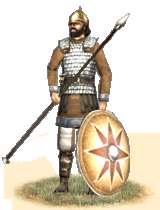Shipri Tukul (Babylonian Heavy Spearmen)
 |
Weapons | Defence | Mental | ||||||
|---|---|---|---|---|---|---|---|---|---|
| Primary | Secondary | Armour: | 9 | Morale: | 11 | ||||
| Type: | spear | mace | Shield: | 4 | Discipline: | disciplined | |||
| Attack: | 14 | 8 | Skill: | 8 | Training: | highly_trained | |||
| Charge: | 8 | 8 | Recruitment | Other | |||||
| Lethality: | 0.13 | 0.165 | Soldiers: | 40 | Hit Points: | 1 | |||
| Range: | 0 | 0 | Cost: | 1367 | Mass: | 1.2 | |||
| Ammo: | 0 | 0 | Upkeep: | 342 | |||||
| Turns: | 1 | ||||||||

These heavy infantrymen use the old pointed Assyrian helmet and have iron scale corselets. Their weapons are the sword and spear. Their defence is the old fashioned Aspis shield faced with bronze.
Disciplined
Sapping ability
These heavy infantrymen use the old pointed Assyrian helmet and have iron scale corselets. Their weapons are the sword and spear. Their defence is the old fashioned Aspis shield faced with bronze. Their role on the battlefield is that of well drilled loose order infantry organized along the lines of Hellenistic Thureophoroi.
Historically, the Hellenistic monarchies established after Alexander the Great’s conquest used the military settlement system widely, probably taking it over from the Persians. Native heavy infantry such as this was not well regarded by the Hellenic conquerors of Asian territories nor particularly trusted. Necessity, however, required troops to govern the kingdom and these troops were readily available and these considerations applied as well to the Parthian that would supplant the Seleucid Empire as masters of the lands where these heavy infantrymen were recruited. They came from the Aramean population of Babylonia, Syria and the Jews of Mesopotamia. While not playing the same significant role that Jews played in the Ptolemaic military system these men were present in significant numbers.